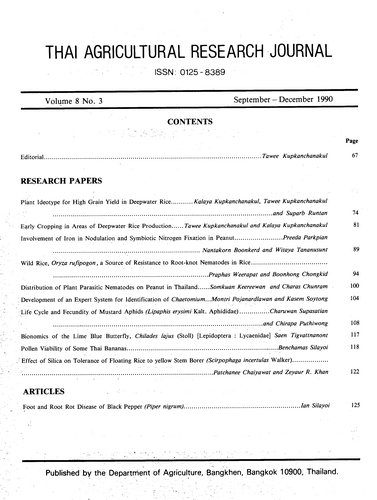Involement of Iron in Nodulation and symbiotic Nitrogen Fixation in Peanut
Abstract
Iron (Fe) deficiency limits crop production on black calcareous soils (Typic Calciustolls) of Thailand. Most of the blck calcareous soils are considered quite fertile, however, the presence of CaCo3 and alkaline pH may cause Fe deficiency in field crops. severe Fe chlorosis on peanut failed to nodulate untill given foliar Fe applications.
Glasshouse experiments were conducted on two cultivars (Tainan 9 and Robut 33-1) to identity which stage of the nodule symbiosis was most sensitive to Fe deficiency. The findings suggested that Fe deficiency specifically limited nodule development in peanut. However soil and rhizos here Bradyrhizobium populations were not limited in the calcereous soils producing Fe deficiency. In adition, root infection by bradyrhizobium was not restricted. Plants sprayed with Fe produced greater numbers of excisable nodules and carried a greater nodule mass than unteated plants. Fice days after Fe application, nodules on sprayed plants of cv. Tainnan 9 contained 200 - fpld higher bacteriod numbers per unit weight and 14 fold higher concentration of leghaemoglobin. The activity of nitrogenase exzyme was also delayed by Fe deficiency in both cultivars.
Downloads
Published
How to Cite
Issue
Section
License

This work is licensed under a Creative Commons Attribution-NonCommercial-NoDerivatives 4.0 International License.
Thai Agricultural Research Journal



